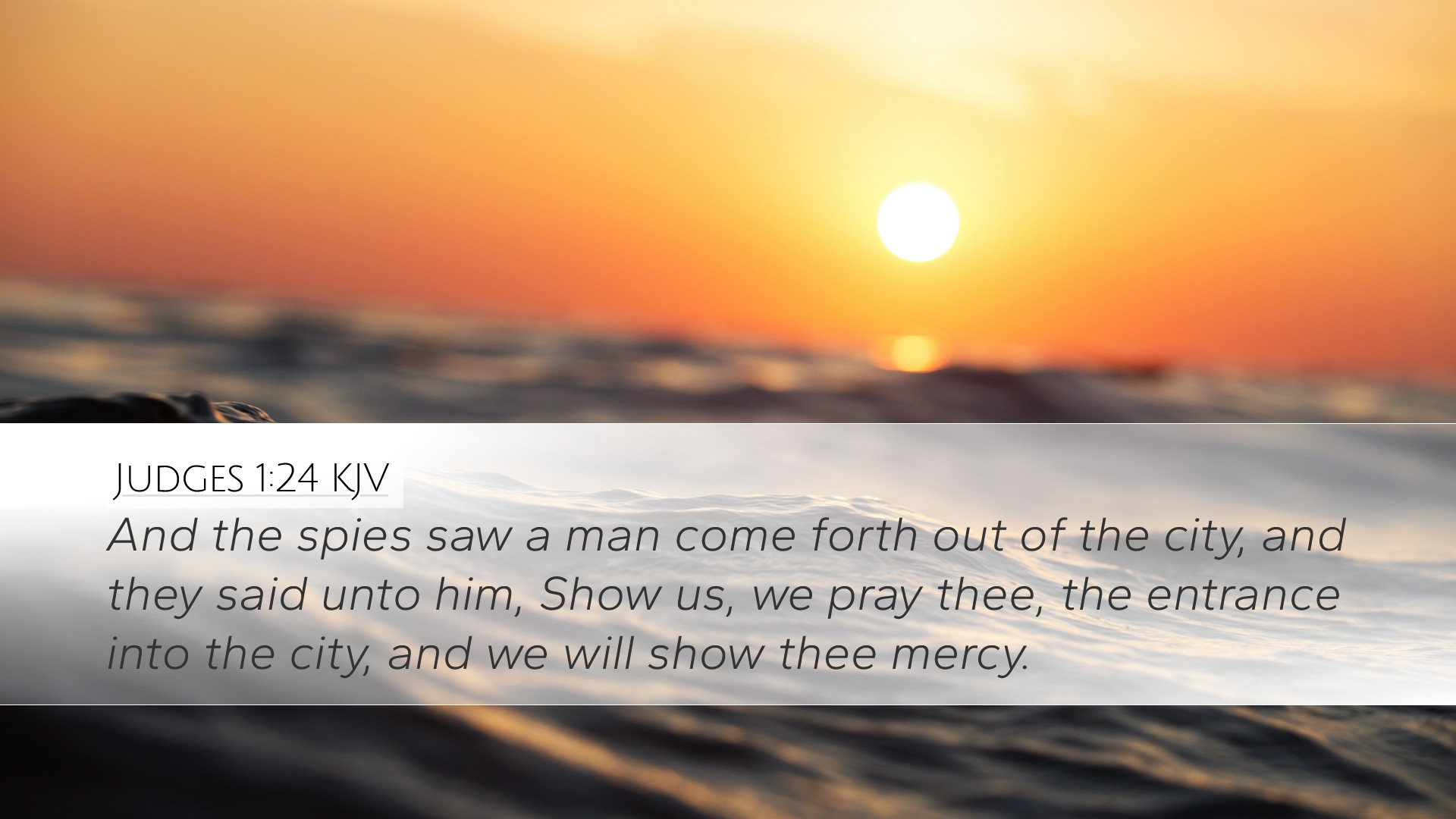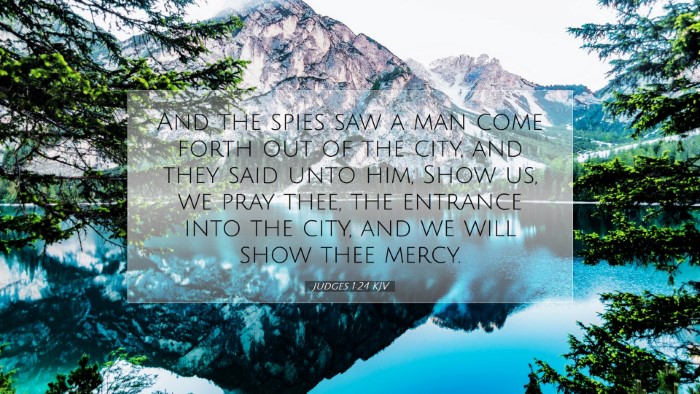Commentary on Judges 1:24
Verse: “And the spies saw a man come forth out of the city, and they said unto him, Shew us, we pray thee, the entrance into the city; and we will shew thee mercy.”
This verse, set against the backdrop of the Israelite conquest of Canaan, provides profound insight into the themes of strategic warfare and divine mercy. The interaction between the Israelite spies and the inhabitants of the city emphasizes God's providence and the transformative nature of mercy. Below is a synthesized commentary from prominent public domain scholars.
Contextual Background
The Book of Judges narrates a pivotal period in Israel's history, where the nation, after the death of Joshua, experienced cycles of sin, oppression, repentance, and deliverance. Judges 1 focuses on the initial conquests of the tribes as they sought to secure the Promised Land. This specific verse occurs during attempts by the tribe of Judah to gain footholds in the territory of the Canaanites.
Insights from Matthew Henry
Matthew Henry highlights the significance of the spies' request, noting it reflects a tactical approach to conquest rather than sheer violence. By seeking to understand the city’s defenses and negotiating a peaceful entry, the Israelites demonstrate prudence. The invitation for the man to show them the entrance into the city indicates a willingness to engage with the inhabitants rather than adopt an outright hostile approach.
- Mercy over Wrath: Henry emphasizes that mercy is extended towards the Canaanite man. This mercy serves dual purposes: it allows the Israelites to secure information crucial for their conquest and illustrates God's overarching plan to reveal His character through His people.
- Human Agency: The request for direction shows the role of human action in fulfilling divine promises. While God promised to deliver the land into their hands, the Israelites still must engage in strategic and thoughtful action.
Reflections from Albert Barnes
Albert Barnes elaborates on the interplay between faith and action in this verse. He suggests that the spies' inquiry can be seen as a demonstration of faith combined with practical wisdom. The act of asking for guidance from an insider exemplifies a blend of divine reliance and calculated human effort.
- Divine Providence: Barnes argues that the orchestrating of events—where a man comes forth at the right moment—shows God's providential hand at work within the plans of the Israelites.
- Trust and Cooperation: The admonition to show mercy signifies a necessary relationship built on trust between the Israelites and the local populace. It conveys a larger theology of cooperation, where the two opposing factions may find common ground through mercy.
Insights from Adam Clarke
Adam Clarke delves into the pragmatic aspects of the spies’ approach, highlighting their need for information to facilitate a successful conquest. Clarke notes that this was a common practice in ancient warfare, where understanding the enemy's strengths and weaknesses could turn the tide of battle.
- Cultural Context: Clarke posits that the engaged man symbolizes the possibility of integration and redemption even among enemies. His willingness to assist indicates that God can work in the hearts of those who may initially seem opposed to His people.
- Redemptive Leadership: The spies' conduct in seeking a strategic alliance rather than outright destruction can serve as a model for modern leadership, demonstrating how mercy serves as a bridge even in conflict.
Theological Themes
This succinct verse encapsulates vital theological themes that resonate throughout Scripture:
- The Nature of God’s Mercy: The plea for mercy is pivotal; it invites reflection on how divine mercy extends to all, even those outside the covenant community.
- The Role of Human Agency: The interaction underscores the theological balance between divine sovereignty and human responsibility—God’s plans unfold through the willing actions of His people.
- Strategic Warfare in Faith: Lessons can be drawn on the importance of wisdom and strategy in the Christian life, promoting the idea that believers are called to thoughtful engagement rather than blind aggression.
Practical Applications
For pastors, scholars, and theologians, the lessons from Judges 1:24 offer rich, actionable insights:
- Encouragement of Strategic Discipleship: Just as the spies sought to learn about the city, today’s leaders can encourage their congregations to be informed, prayerful, and strategic in their outreach efforts to the communities they inhabit.
- Emphasizing Mercy in Ministry: This verse serves as a reminder to act with mercy and compassion, embodying Christ’s love even toward those who might initially seem adversarial.
- Understanding God’s Providence: Life situations may mirror the unpredictability of the spies’ scenario; yet believers can trust that God’s providential hand guides their paths, even through unexpected encounters.
Conclusion
Judges 1:24 exemplifies the intricate dance between human agency and divine mercy, offering timeless insights into the nature of God’s faithfulness. The scholarly reflections from Henry, Barnes, and Clarke converge on the significance of mercy, strategic action, and divine providence, providing a comprehensive framework for application in contemporary ministry. This commentary serves as an exhortation for all believers to navigate their calling with wisdom, compassion, and a reliance on God’s guiding hand.


